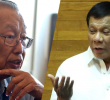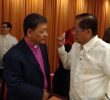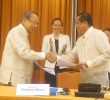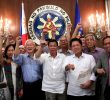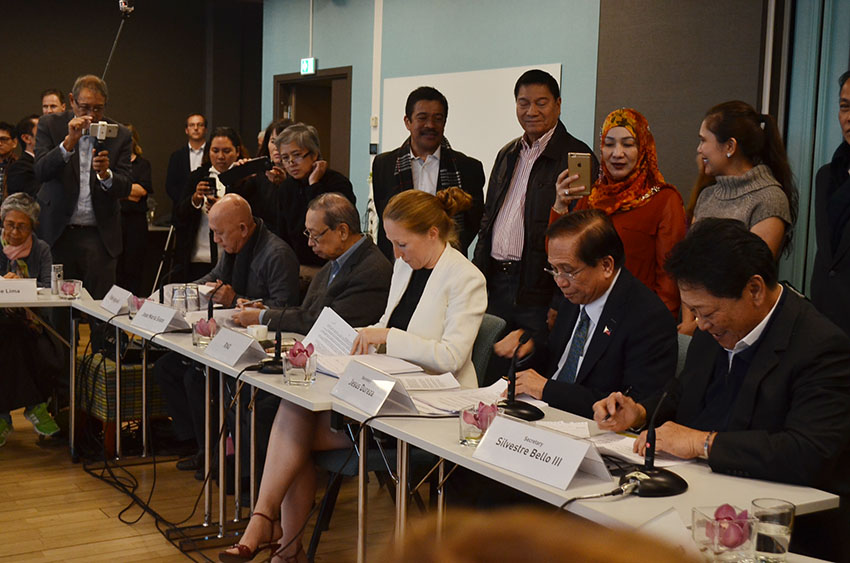
JOINT STATEMENT SIGNING. Members and officials of the government panel and the National Democratic Front of the Philippines sign the joint agreement for the second round of talks. The peace talks was facilitated by the Royal Norwegian Government. In photos: Fidel Agcaoili, chief negotiator of the NDF peace panel; Jose Maria Sison, chief political consultant of the NDF; Elisabeth Slattum, special envoy for peace of the RNG, Secretary Jesus Dureza, Presidential Peace Adviser, and Secretary Silvestre Bello III, GRP panel head. (Zea Io Ming C. Capistrano/davaotoday.com)
ASKER, Norway — Peace panel negotiators from both government and the communists concluded its second round of talks with common frameworks and outlines on social, economic and political reforms and a commitment to grant amnesty to more than 400 political detainees.
Despite the contentious issues, Fidel Agcaoili, newly installed chief negotiator of the NDF, said the second round of talks is still successful because things are moving forward, adding that the NDF hopes that there will be releases of political prisoners by October 27, the target date of the signing of an interim bilateral ceasefire agreement.
“It was a roller-coaster ride but in the end, both parties reached their desired destination,” said Labor Secretary and government panel chair Silvestre Bello III during the signing of the joint statement at the Holmenfjord Hotell around 2 p.m. (Norway time).
The room was filled with the heads and members of both Parties, members of their respective reciprocal working committees and reciprocal working groups, advisers, experts, technical personnel and observers. Among the observers are six members of the House of Representatives committee on peace and reconciliation.
“The GRP Panel affirms its commitment to work for the release of these prisoners in expeditious and acceptable modes,” the joint statement reads.
Bello said “We will not give you timelines but we will deliver the expectations of the NDF-CPP-NPA.”
There are 434 political detainees who are covered by the draft proclamation sent to the Office of the Executive Secretary on September 15. The amnesty proclamation was part of the commitment by President Rodrigo Duterte and the government during the preliminary talks.
The NDF pushed for the release of all political prisoners in “compliance with the Comprehensive Agreement on Respect for Human Rights and International Humanitarian Law.”
The NDF said the move would serve as a “big incentive” for a more stable kind of ceasefire. Both the AFP and the NPA are on ceasefire following unilateral ceasefire declarations by Philippine government and the NDFP last August.
In their joint statement on the first round of talks on August 27, both Parties agreed to reach an interim bilateral ceasefire after 60 days or on October 27.
At the close of the second round of talks, Agcaoili said the bilateral ceasefire agreement and other issues “are interconnected.”
“It is something that depends on how they move, how fast and how sincere they are moving,” he said.
Common outlines Ok’d
At the close of the second round of talks, both parties approved a common framework and outline on the comprehensive agreement on social and economic reforms. The next bilateral meetings of the committees will correspond to the formal meetings of the Negotiating Panels.
The working group on the political and constitutional reforms also agreed on a common outline which will be fleshed out by each side by November to December this year in the Philippines.
Among the reforms outlined were:
- National sovereignty and self-determination
- Economic sovereignty and national patrimony
- Self-determination, national minorities, indigenous peoples, and Bangsamoro
- Social justice
- Form/system of government
- Electoral and political party reforms
- Constitutional bodies
- Accountability and good governance
- Judicial reform
- Fiscal policy and management
- Security reform, and
- International relations
“The two sides shall exchange the enfleshed drafts of the common outline in the last week of January 2017 by email,” the joint statement said.
Meanwhile, the RWG on the end of hostilities and disposition of forces agreed on an eight-point topic outline including the preamble, declaration of principles bases, scope and applicability; definition of terms; end of hostilities; disposition of forces; mechanisms; and concluding provisions.
Both the government and the NDF also agreed to exchange drafts of the outline after the completion of the drafts of the CASER and CAPCR.
In a press briefing Saturday, NDF panel spokesperson Dan Borjal clarified that even with the accelerated peace process, the agenda would still be sequential.
“The acceleration there is the working groups and committees are simultaneously working on their drafts,” he said.
Both Panels will meet again on the third week of January 2017 “in a foreign neutral venue”. (davaotoday.com)

